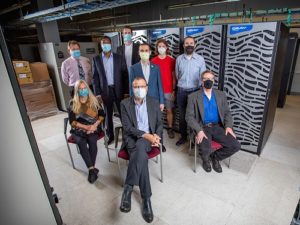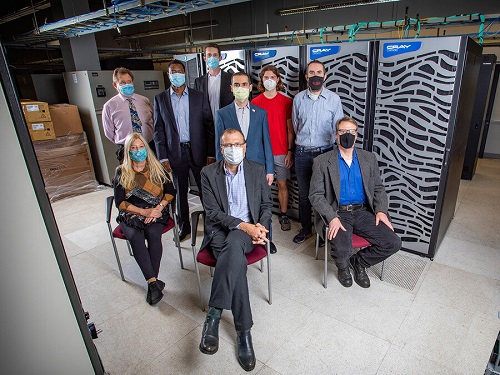
The Ookami computer cluster team at Stony Brook University
The Institute for Advanced Computational Science (IACS) at Stony Brook University has installed an HPC system employing the same processor technology as the world’s top-ranked supercomputer, the Fugaku system at the RIKEN Center for Computational Science in Japan. Available to researchers as a testbed, Ookami (which means wolf in Japanese) is run by IACS in partnership with the Center for Computational Research at the University at Buffalo.
Ookami is one of the first computers outside of Japan to be powered by the HPE Apollo 80 system, which was originally developed by Cray and Fujitsu, and uses the Fujitsu A64FX Arm-based processor. The system also will use the Cray ClusterStor E1000 storage system from HPE to support massive data capacity requirements.
Stony Brook is a user of Bright Cluster Manager software, designed to reduce the complexity of building and managing high-performance Linux clusters. “Bright Computing has a long history of working with Cray on state-of-the-art supercomputers, and we are delighted to continue this under the new merge with HPE. Our engineers have worked closely with Fujitsu’s A64FX-based development team to ensure Bright Cluster Manager seamlessly manages A64FX-based systems like the HPE Apollo 80 in the same way we manage traditional intel-based servers. We are proud to play our part in bringing all these technologies together for our valued customer, Stony Brook,” said Lee Carter, VP Alliances at Bright.
Ookami is supported by the National Science Foundation Office of Advanced Cyberinfrastructure.
Interested users should contact IACS at iacs@stonybrook.edu.
“This system has a nearly magical combination of programmability, performance and efficiency, with the potential to transform computational research in many areas of science, engineering, and industry,” says Robert Harrison, PhD, professor of Applied Mathematics and Statistics and director of the IACS. “Ookami is a resource for researchers in academia or industry nationwide. Its use opens the door for researchers to explore new computing technologies that could greatly impact the future of high-performance applications.”
“We are committed to expanding high-performance computing capabilities by developing flexible systems that can support new, diverse architectures such as with the HPE Apollo 80 using Fujitsu’s A64FX processor, purpose built for HPC,” said Bill Mannel, vice president and general manager, HPE. “We are honored to empower Stony Brook University’s mission to test new technologies that will accelerate a path of innovative HPC technologies, including a roadmap to exascale.”




